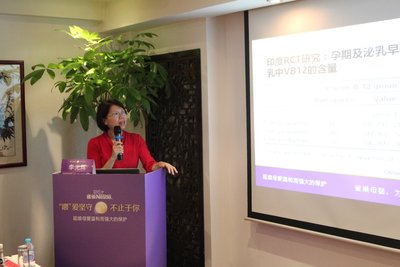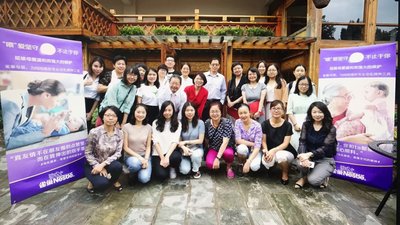BEIJING, July 26, 2017 /PRNewswire/ -- August 1 to 7 every year is the World Breastfeeding Week and the theme this year is "Sustaining breastfeeding, together!". As an infant nutrition expert that has long kept an eye on maternal and child health in China, Nestle held a series of publicity activities themed "Together, holding on to breastfeeding!" during this period, to call on the whole society to pay attention to breastfeeding and contribute to improving the health index of children during the first 1000 days of their lives.

Nestle has been conveying the idea through a variety of activities that breastfeeding not only is to meet the nutritional requirements of infants, but has a significant impact on short and long-term health of mothers and infants as well. The mother's insistence in breastfeeding with the strong support of the families, friends, companies and others not only relates to the long-term happiness of a family, but also has a profound impact on social and economic development.
Breast milk is a kind of mysterious food endowed to mankind by nature with a history more than 200 million years. With the development of science and technology, the mysterious veil of breast milk has been opened layer by layer and people gradually come to realize that "breastfeeding" is not simply satisfying the baby's hunger.

Nestle has persisted in research on and advocation of breastfeeding over the years and established special breast milk research teams all over the world, including Maternal Infant Nutritional Growth (MING)* established with huge investment in China in 2011, to understand the maternal and infant nutrition status in Chinese cities under condition of rapid socio-economic changes and carry out in-depth study on the composition of breast milk of Chinese healthy mothers. A large number of MING research data reveals the nutritional contents of breast milk and confirms the benefits of breastfeeding.

Breastfeeding brings a lot of benefits
Professor Zhixu Wang, Chairman of the Chinese Nutrition Society Maternal and Child Nutrition Branch
As found in a large number of domestic and foreign studies, including Nestle MING research, the breast milk has a magical "protein system" composed by a variety of hydrolyzed small molecule protein fragments, which overturns the traditional view that the infants start digestion of breast milk in their stomach. The hydrolysis of proteins is achieved by hydrolase and occurs at all stages from the mother's mammary gland to the infant's intestine. The latest study revealed that the activity of hydrolase in breast milk is influenced not only by the lactation process, but also by the infant maturity, in other word, the enzyme in the colostrum has a higher activity than that in the mature milk, and that in the breast milk of a premature infant's mother has a higher activity than that in the breast milk of a term infant's mother. The special and amazing protein system in breast milk has its own special significance and plays an important role in the infant's health. As infant has a poorer digestive function, spontaneous hydrolysis of protein in breast milk can be seen as an effective compensation for the immature development of the digestive system. The hydrolyzed protein fragments reduce the risk of metabolic burden on the immature metabolic system of infants.
Lawrence Li, Chief Medical Science and Compliance Officer, Nestle Greater China
The infants' intestinal microecology is important for their long-term health. Breastfeeding contributes to early and rapid establishment of healthy intestinal flora in infants, especially the cesarean ones. Breast milk is rich in microbial flora, and contains Bifidobacterium and Lactobacillus, two probiotics that play a significant role in early intestinal microecology of infants. Nestle MING research in 2011 and 2012 reported the microbial composition of breast milk of mothers living in Chinese cities and contents of the 10 most important breast milk oligosaccharides for the first time. Oligosaccharides are an important food for probiotics. Although the breast milk does not contain too many probiotics, the rich oligosaccharides provide them with adequate food to ensure that they can multiply rapidly and maintain an advantageous position after colonization, thus not only ensuring the infants' intestinal health, but also promoting the development of their immune system.
Professor Guanghui Li from Department of Perinatal Medicine at Beijing Maternity Hospital
Composition of the breast milk can have a direct impact on infant health. With the deepening of research in this field, scientists have found that breastfeeding outcomes or breast milk composition itself are also influenced by a lot of factors, such as the mother's weight before pregnancy and nutritional status during pregnancy. Pre-pregnancy obesity may delay the first breastfeeding or increase the risk of lactation failure. Study found that excessive weight gain due to poor management of nutrition during pregnancy may also shorten the lasting time of breastfeeding. Another very interesting phenomenon is that although currently there is not much research data, studies have shown that supplementation of probiotics during pregnancy will increase the number of such probiotics in the infants' intestine, which increases possibility for the early establishment of healthy intestinal flora in infants. Reasonable and balanced nutrition during pregnancy and childbirth not only promotes the healthy growth of the fetus, but also ensures the nutrition of the mothers, to further lay the foundation for successful breastfeeding.
Breastfeeding, you are not alone
During the annual breastfeeding week, it is of great significance that Nestle launched the "Together, holding on to breastfeeding!" activities. For children, breastfeeding lays the foundation for their life-long health; for families, it is the key to enhancing the family happiness index; and for society, it is an effective way to reduce the social and economic burden and promote harmonious development.
Binu Jacob, vice president of Infant Nutrition, Nestle Greater China said: "MING research findings show that there are 42.8% of infants below 6 months of age exclusively receiving breastfeeding and there is still a lot of room for this data to rise. Therefore, Nestle has been sparing no effort in promoting breastfeeding. In addition to special establishment of breastfeeding module through the 'Start Healthy, Stay Healthy' nutrition education project to spread knowledge of maternal and child nutrition and feeding solutions, Nestle also keeps launching a variety of activities during the Breastfeeding Week every year to call on the whole society to support breastfeeding."
This year, Nestle carried out "Together, holding on to breastfeeding!" series activities during the Breastfeeding Week to call for attention of fathers, care of the family members, help of the colleagues, listening of friends, and understanding and support of the whole society. What's more, the "breastfeeding tools" have been tailored for mothers by using modern technology and platform to solve the problems encountered in breast feeding at any time.
It is clearly put forward in the "National Nutrition Plan" recently launched by the State Council that the breastfeeding rate among 0 to 6-month infants should reach 50% or above by 2020 and realization of this goal requires efforts of everyone and every organization". In addition, as the first infant formula producer included in the FTSE Social Responsibility Index, Nestle promises not to advertise or carry out any promotional activities for infant formula for 0 to 12-month infants so as to encourage breastfeeding.
Maternal Infant Nutritional Growth (MING): A large-scale survey project on maternal and infant nutrition & health and composition of breast milk initiated by Nestle (China) Co., Ltd. and jointly undertaken by School of Public Health, Peking University, NRC and Nestle Nutrition Institute.
Photo - https://photos.prnasia.com/prnh/20170726/1907226-1-a
Photo - https://photos.prnasia.com/prnh/20170726/1907226-1-b
Photo - https://photos.prnasia.com/prnh/20170726/1907226-1-c